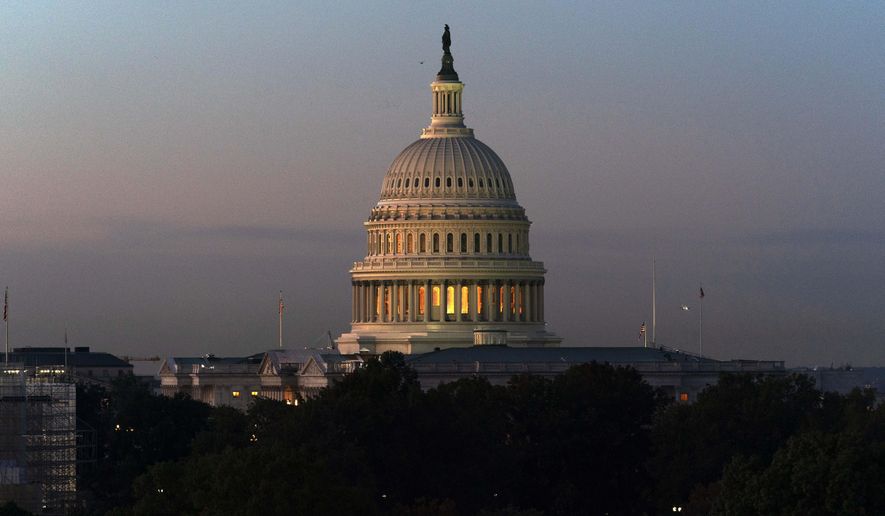Members of Congress are still unpacking the results of the midterm elections, but they returned Monday to Washington with plenty to do, such as funding the government and authorizing key defense programs.
Senate Majority Leader Charles E. Schumer over the weekend said senators should expect “heavy work” and “long hours” even as the final makeup of next year’s Senate hinges on a December runoff election in Georgia and key House races remain unsettled.
Most notably, Congress must pass a funding bill before Dec. 16 to avoid a government shutdown. Democrats could try to add special provisions to the bill — including funding for Ukraine’s war effort and the COVID-19 fight — because the GOP is poised to take over the House and is more skeptical of those efforts.
A second priority is the National Defense Authorization Act, or NDAA, a bill that outlines defense priorities and authorizes funding for them. Increased funding for Taiwan’s security in the face of Chinese threats and possible moves to punish Saudi Arabia for its decision to cut oil production may be considered.
On the Senate side, Mr. Schumer has promised to hold a vote on a bill that would codify the right to same-sex marriage instead of relying on the 2015 Supreme Court decision that made it legal across the country.
Democrats are worried the court’s conservative majority will take a second look at the Obergefell v. Hodges decision after it struck down Roe v. Wade and the nationwide right to abortion.
The Senate measure would need at least 10 Republican votes to overcome the filibuster threshold and advance, so it is unclear if the Democratic measure will get the requisite support.
Mr. Biden also wanted Congress to pass a bill that would codify abortion rights in federal law, even if it meant waiving the filibuster threshold.
Yet Republicans aren’t interested, and voters did not expand the Democratic majority in a way that could overcome centrist Democrats who refuse to get rid of the 60-vote filibuster threshold.
Instead, Democrats are on track to hold a razor-thin majority in a split chamber, with Vice President Kamala Harris serving as a tie-breaking vote, or a 51-49 majority if Sen. Raphael Warnock defeats Republican challenger Herschel Walker in next month’s Georgia runoff.
The parties in the Senate and House must balance legislative work with leadership elections ahead of the new Congress. The GOP’s leaders, Kevin McCarthy in the House and Mitch McConnell in the Senate, are forging ahead with leadership elections this week despite vocal calls from some conservatives to hold off until after the Georgia runoff on Dec. 6.
A delay could allow rifts between Mr. McConnell and senators like Rick Scott of Florida to widen and burst into the open or upset Mr. McCarthy’s path to House speaker.
House Democrats, meanwhile, must figure out whether they will move on from Speaker Nancy Pelosi of California as their longtime party leader.
Senators are also working on a bipartisan bill to reform how electoral votes are counted and certified so it is harder to challenge or overturn the presidential results, something that came into sharp focus during the Jan. 6, 2021, riot at the U.S. Capitol.
Also, Congress will probably grapple with whether to raise the debt limit before the end of the year. Democrats say it is vital to extend the nation’s borrowing authority when the Treasury tells them it is time, arguing the nation cannot risk default.
However, Republicans have signaled they will play hardball and might be unwilling to bless new borrowing given the Democrats’ big-spending agenda of late.
Mr. Schumer said Monday he would like to extend the debt ceiling in the lame-duck period.
“That’s something we’d like to do, best done on a bipartisan basis. I’m going to talk to my caucus and the leadership on the other side of the aisle to see what we can get done,” he told CNN’s “This Morning.”
Among quirkier issues, the Senate earlier this year passed a bill that would make daylight saving time permanent so the U.S. doesn’t turn back the clock every November.
It is unclear if the House will take up the bill before the Congress expires. Some lawmakers want to take their time with the issue, given concerns that children will head to school in the morning darkness if the clocks aren’t changed in the fall.
• Tom Howell Jr. can be reached at thowell@washingtontimes.com.




Please read our comment policy before commenting.